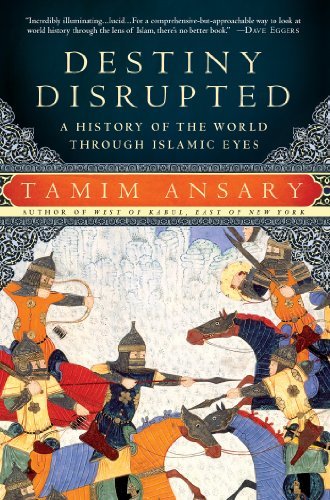History Of The World From An Islamic Perspective
The history of the world from an Islamic perspective is an important subject to explore in order to gain a better understanding of the development of Islamic civilization and its impact on the world. This history is rooted in the teachings of the Islamic faith and its principles of justice and mercy. From the 7th century onward, Islam spread rapidly throughout the Middle East, North Africa, and parts of Europe, leading to the establishment of a powerful Islamic empire. Over the centuries, this empire saw the development of a sophisticated culture, expansive trade networks, and an evolution of Islamic art, architecture, and literature. This legacy has shaped the world in ways that are still felt today. By exploring the history of the world from an Islamic perspective, we can gain a better insight into the contributions that Islam has made to the global community, and how it has shaped and influenced the modern world.
Pre-Islamic History
Pre-Islamic history is a vital part of the Islamic perspective on the world. Before the advent of Islam, the Arabian Peninsula was populated by various polytheistic tribes and societies. These tribes maintained trade and communication with other civilizations such as the Babylonians, Egyptians, and the Persians. These civilizations contributed to the development of Islamic culture and ideology. Through a combination of their own unique traditions and ancient influences, the early Islamic civilization developed their own unique culture.
The Islamic perspective on the world’s history is largely based on the teachings of the Qur’an and the Hadith, which provide insight into the evolution of Islamic culture. The Qur’an emphasizes the importance of understanding the historical context of the Arab world, and it provides a basis for understanding the development of Islamic civilization. The Hadith also provides information about the development of Islamic thought and culture.
Through their own unique culture and beliefs, the Islamic civilization has contributed to the development of the world’s history. From the Middle Ages to the modern era, the Islamic civilization has shaped the course of world history and continues to influence the world today. From the intellectual and cultural exchanges between the Islamic world and the rest of the world, to the impact of Islamic empires on the global economy, the Islamic perspective on history has played a key role in the development of the modern world.
The Rise of Islam
Islam is one of the world’s oldest religions, tracing its roots back to the 7th century CE. It has since spread across the globe, with millions of adherents from diverse cultures and backgrounds. The history of Islam is often viewed from a Eurocentric perspective, but this overlooks the unique contributions of Islamic civilization. This article offers an in-depth look at the rise of Islam, exploring its origins, history, and impact on the world.
Beginning in the Arabian Peninsula, the religion spread to other parts of the world over the centuries, ushering in new forms of art, architecture, literature, science, and philosophy. From the Umayyad Caliphate in the 7th century to the modern-day nation-states of the Muslim world, the influence of Islamic culture has been felt around the globe.
The rise of Islam is also associated with the development of a unique political system, the Caliphate. This system of government, based on Islamic law and religious beliefs, was adopted by Muslim rulers and remains a source of debate to this day.
Islamic art and architecture have also made their mark on history. From the Taj Mahal to the Alhambra, many of the world’s most impressive monuments are products of Islamic civilization. The art and literature of the Islamic world also offer a unique insight into the culture and its history.
Finally, the rise of Islam has had a profound impact on the modern world. From the Middle East to Southeast Asia, its influence is still felt in politics, culture, and everyday life. This article provides a comprehensive overview of the rise of Islam and its influence on the world.
Key Islamic Figures and Events
Islam is one of the oldest and largest religions in the world, with an impressive history and numerous influential figures. Throughout the centuries, many key figures and events related to Islam have shaped the course of world history. The following are some of the most prominent figures and events associated with the Islamic faith, and their impact on the world.
Among the most influential Islamic figures is the Prophet Muhammad, the founder of Islam and the last messenger of God. His teachings have been followed by millions of Muslims for centuries, and his message of peace and justice is still relevant today. Other important figures include the Caliphs Abu Bakr and Umar, who were the first two successors of Muhammad, and Ali ibn Abi Talib, who was the fourth Caliph and is revered by Shi’a Muslims.
The most important event in Islamic history is the Hijra, the migration of Muhammad and his followers from Mecca to Medina in 622CE. This event marks the beginning of the Islamic calendar and is a major event in the Islamic faith. Other important events include the Battle of Badr in 624CE, the Battle of Uhud in 625CE, and the Battle of Karbala in 680CE. These battles were key events in the development of the Islamic faith and helped to shape the course of world history.
These figures and events have had a lasting impact on world history and have helped to shape the world we live in today. From the teachings of the Prophet Muhammad to the Islamic conquests of the 7th century, the history of the world from an Islamic perspective has been influential and far-reaching.

Islamic Expansion and Spread of Influence
The Islamic faith is a religion of over 1.6 billion adherents, with a history of expansion and influence that spans centuries. Its reach began in the 7th century, with the teachings of the Prophet Muhammad and the subsequent spread of Islam as an empire. As the Islamic faith spread, so too did its impact on the world.
The Islamic Empire grew in size and power, and soon encompassed all of the Middle East, North Africa, and parts of Europe and Asia. The Islamic Empire was known for its culture, art, science, and law, which was based on the tenets of the Quran. Islamic scholars developed new theories in mathematics, medicine, astronomy, and philosophy, which influenced the development of the modern world.
The Islamic Empire also had a major impact on trade, with traders from the region playing a major role in the spice and slave trades. The Islamic legal system, known as Sharia law, was adopted by many countries as their legal code, while Islamic architecture and art influenced buildings and monuments around the world. Additionally, the Islamic faith laid the foundations for the modern banking system, as well as the development of the first universities in Europe.
The Islamic faith has continued to expand throughout the world, and its influence has shaped the history of the world in ways that can’t be understated. As the Islamic faith continues to grow in size and influence, so too will its impact on the world.
Islamic Contributions to Science and Culture
The Islamic world has contributed significantly to science, culture, and society throughout history. Muslim scholars have made substantial contributions to mathematics, astronomy, medicine, and philosophy. Islamic culture has also shaped literature, art, architecture, and music. Its influence can be seen in many places, from the Taj Mahal to the Alhambra Palace. Islamic culture has also made a major impact on world cuisine, with its use of spices, herbs, and other ingredients.
The Islamic world was also a major player in the development of science. From the 8th century onwards, Muslim scholars and scientists made advances in mathematics, astronomy, medicine, and philosophy. The works of classical Muslim scholars such as Al-Khwarizmi, Al-Kindi, Al-Biruni, and Ibn Sina laid the foundations for the development of modern science. Their discoveries revolutionized the way we understand and think about the world.
The Islamic world has also been a major contributor to the arts. Islamic art has long been celebrated for its intricate patterns and vibrant colors. From mosques to palaces, Islamic architecture is renowned for its beauty. Islamic literature and poetry have been influential in many cultures, and Muslim musicians have developed a unique style of music.
The Islamic world has played an integral role in human history. From advancing science to influencing art and culture, Muslims have had a profound impact on the development of the world.
Islamic Impact on Modern History
The history of the world is one that is filled with many different influential cultures and belief systems. One of the most prominent and impactful of these has been Islam. It has not only shaped the Middle East and North Africa, but it has left its mark on the world in many other ways. Islamic culture has had a profound influence on the development of the countries and societies that it has impacted. From its expansion in the 7th century, to the modern day, Islam has been a powerful force in the world.
The spread of Islamic culture and beliefs has been attributed to its strong emphasis on education, its promotion of trade, and its legal system. Islamic scholars have created a rich library of books, literature, and documents, which have been the basis for much of the modern world’s knowledge. Islamic law has been used to create laws and systems in countries all around the globe, including the United States. Islamic culture has also had a strong influence on the world’s art, literature, and music.
The Islamic faith has a long and complex history, and its impact on modern history is undeniable. From its spread throughout the Middle East and North Africa, to its influence in the West, Islam has left its mark on the world in many different ways. Through its culture, religion, and legal system, Islam has been a powerful force in the world, and its influence is still felt today.
FAQs About the History Of The World From An Islamic Perspective
1. How does an Islamic perspective of history differ from a traditional view?
Answer: An Islamic perspective of history emphasizes the importance of the Quran and Islamic teachings as primary sources of knowledge. It also emphasizes the contributions of Muslim scholars and rulers, while giving greater attention to the cultural and spiritual aspects of history.
2. What are some of the major events in world history from an Islamic perspective?
Answer: Some of the major events in world history from an Islamic perspective include the rise of the Islamic Caliphate in the 7th century, the spread of Islamic culture and law throughout the Middle East and North Africa, the rise of the Ottoman Empire, and the advent of modern Islamic movements.
3. How does the Islamic view of history differ from that of other religions?
Answer: The Islamic view of history is distinct from other religious perspectives in that it is based on the teachings and traditions of the Quran and Islamic law, rather than on secular or religious interpretations of history. It also gives greater emphasis to the contributions of Muslim scholars and rulers, while giving greater attention to the cultural and spiritual aspects of history.
Conclusion
The history of the world from an Islamic perspective can be seen as an incredibly diverse, rich, and complex narrative. It is a history that is varied and complicated, and yet one that brings together the many threads of the Islamic world and its diverse cultures. From the rise of the Islamic empires in the Middle East, to the spread of its culture and beliefs throughout Europe and the Mediterranean, to its influence on global politics and culture today, Islam has had an incredibly significant impact on world history. As such, the Islamic perspective of world history is an essential part of understanding the history of the world as a whole.


